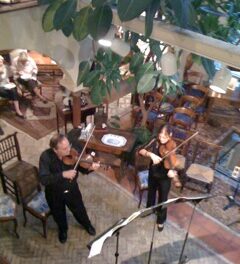It has been eight years since Lenora Thom became Music Director of the Asheville Choral Society. In that time, she has shaped the chorus into one that knowledgeable people always look forward to hearing. For the most part, their “Magnificent Christmas” concert lived up to those expectations in two performances Saturday and Sunday December 13-14 at Central United Methodist Church.
I had mixed feelings about the first group, which consisted of six contrasting settings of the Magnificat (the Song of Mary). This choice was perhaps too cerebral for a majority of the audience. The concert had attracted many lovers of choral music who are not musicologists but came to hear a joyous Christmas concert. So while I found the six settings of the Magnificat to be fascinating, others told me they could have happily stopped with four.
That said, it was intriguing to realize that the same text could be treated successfully in so many ways in two languages (Latin and English). We heard baroque Lutheran counterpoint (Johann Sebastian Bach), twentieth-century Anglican harmony (Herbert Howells), modern ethereal harmony (Arvo Pärt), baroque antiphony (Charles Theodore Pachelbel arranged by Ms. Thom), a romantic English treatment (Gerald Finzi) and an operatic German version as only Wolfgang Amadeus Mozart could provide.
All the Magnificats were good, but there were high points. In the Howells version, the twenty-eight-piece orchestra, organ and chorus provided a broad palette of tonal color. Organist Vance Reese distinguished himself with his choice of registration. In the a capella Pärt version, the chorus provided serenity and beauty, enunciation and a gorgeous balanced pianissimo. I found Finzi’s Magnificat to be outstanding in the way his musical passages complement and underscore the English text. Finally, the chorus provided a dramatic conclusion to the six-part marathon by fully expressing the joy that Mozart included in his Magnificat.
“Ave Rex” by William Mathias and “Jubilate Deo” by William Walton providing a thoroughly British postscript, leading up to the intermission. I confess my mind was still processing thoughts about the Magnificats.
While the musical fare became lighter after intermission, it lost none of its quality. Eric Whitacre’s “Lux Aurumque,” an a cappella work, washed over us like the surf at La Jolla Shores. This is a startlingly original work that nevertheless seems inevitable and eternal. In an interesting twist, the text is a 2001 translation into Latin of a five-line English poem. Hearing this work caused me to sit up and take note of this young American composer. I want to hear more of him.
What would a choral Christmas concert be without one of John Rutter’s seasonal works? Rutter’s “Hymn to the Creator of Light” provided the choir an opportunity to demonstrate their eight-part capability. Beautifully blended, they responded to Maestro Thom’s every finger motion. (She had laid aside her baton to conduct this lush work.)
“Seven Joys of Christmas” by Kirke Mechem is an accessible work, a succession of Christmas and other holiday songs from a variety of cultures. The bond between conductor and chorus was very evident. Thom sent signals through her hands, eyes, lips mouthing words and with her dancing body.
Craig Courtney’s “A Musicological Journey Through the Twelve Days of Christmas” concluded the program. A smile was put on the audience’s face by Courtney’s shifting style. Beginning with plainsong for the partridge and progressing through medieval syncopation for the turtle doves, geese in the style of Mozart, maids a-milking to the strains of Wagner’s “Ride of the Valkyries,” ladies dancing to Johann Strauss, pipers piping to Tchaikovsky’s “Nutcracker” and drummers drumming in a John Philip Sousa extravaganza, the combined musical forces of Asheville’s finest chorus and an exemplary orchestra left the crowd in wonderful spirits.











